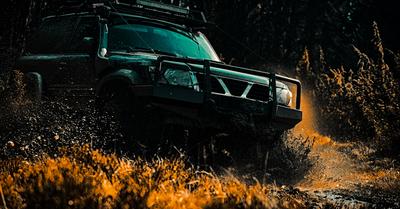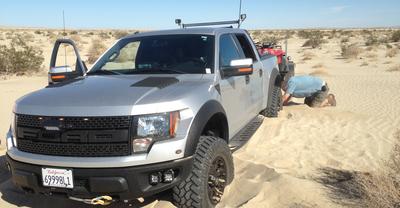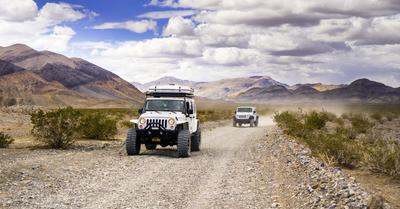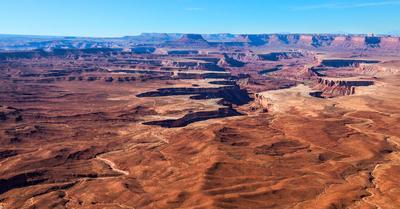Starting an off-road business is just like starting any other kind of business—if you know the steps and have a plan, you have a good shot at success.
To start an off-road business, first, decide what product or service you want to sell. Examples include online parts stores and off-road merchandise brands. Form an LLC or another kind of corporation, find a name, advertise for customers, and aim to be reliable.
In this article, we’ll go over the steps required to start an off-road business. We’ll cover several different kinds of businesses, along with how they turn a profit and the products they sell. Additionally, we’ll go over easy ways to advertise and get the word out about your business.
We sourced this information from experienced business owners who started from scratch, and from the online business community.
This article may contain affiliate links where we earn a commission from qualifying purchases.
Steps to Starting an Off-Road Business
There are a few general steps required to start an off-road business in the 2020s. Thankfully, it’s easier now than it ever was—and it doesn’t always require a massive investment on your part. Here’s a list of steps to take.
- Decide on a Business
- Create a Detailed Business Plan
- Create a Company Name and Logo
- Form an LLC or Another Kind of Corporation
- Set Up a Website
- Set Up Social Media Pages
- Run an Ad Campaign
- Fulfill Orders Fast and Reliably
- Build a Positive Reputation with the Public
We’ll explain these steps in more detail later. Forming a business may seem like a massive task—but as you can see, there are just a few big steps required to get an idea off the ground.
Types of Off-Road Businesses
There are many types of businesses related to off-roading that you can create. They range in size from small to multinational, and they do everything from producing videos to selling or manufacturing products. Here are a few common types of off-road businesses.
Off-Road Parts Store
An off-road parts store is usually the first off-road business that comes to mind. These businesses sell and distribute shocks, lights, skid plates, replacement parts, grille guards, and other accessories that are used specifically for off-roading.
There are many kinds of specialized off-road parts businesses, including but not limited to tire and wheel shops, light and electronic stores, and performance parts distributors. These stores are mostly online-only, as it’s much easier to start an e-commerce company than a brick-and-mortar store.
How do Off-Road Parts Stores Make Money?
Off-road parts stores make money by selling products at a higher price than they pay for them. They do this through buying in bulk and keeping an inventory (as buying in bulk is less expensive) or by drop-shipping.
A drop-shipping parts store develops a relationship with a large-scale supplier, who ships a product when customers order it. The store never keeps an inventory—instead, they just take orders and direct the supplier to ship the product.
Drop-shipping is less reliable than keeping an inventory, and the profit margins are smaller. However, it’s a convenient and affordable way for small parts stores to get their feet off the ground until they can afford to hire staff and get a warehouse.
Off-Road Recovery Business
Off-road recovery companies are engaged in the business of ‘rescuing’ people off-road—more accurately, they get broken and stuck cars out of the way and help people get their vehicles back home.
An off-road recovery business is essentially a 4x4 tow truck and some additional tools, plus the experience required to avoid also getting stuck. This kind of business has a high initial cost, but it can be extremely profitable year-round.
How do Off-Road Recovery Businesses Make Money?
Off-road recovery companies charge people to tow their cars, and they also charge parks to clear abandoned and broken vehicles off the trail. During the off-season, these businesses can tow people out of the snow or plow roads for the city or private owners.
Off-Road Merchandise Brand
Some people start successful businesses that simply sell branded shirts, stickers, hats, and other items. These brand-based products are commonly popularized on social media, and name recognition can go a long way.
These sorts of businesses rely on a “cool” factor and usually gain notoriety by featuring off-road trucks and builds, videos, and other off-roading pages.
How do Off-Road Brands Make Money
Popular off-road brands can make money through social media sponsorships and ads. That said, the most common way these brands turn a profit is by selling shirts, hats, and other merchandise.
Off-Road Clubs
An off-road club isn’t necessarily a business, but it can certainly become one. Membership fees, merchandise, and advertising deals are used by popular clubs to generate revenue to grow and pay salaries.
How do Off-Road Clubs Make Money?
Membership dues are the primary way off-road clubs make money, but it’s not the only way to do it. Club membership can be free if the club charges admission to events, solicits donations from members, or sells club-branded merchandise.
Opening an Off-Road Park
Some people purchase land and create off-road parks, which is a pricey but profitable way to start an off-road business. Off-road parks have trails of varying intensity, and they can charge admission at the gate to generate revenue.
How do Off-Road Parks Make Money?
Off-road parks usually make money through admission fees. A simple shack at the entrance can collect fees, or people can make reservations online and get in with a code. Off-road parks can also make money by selling merchandise, leasing campsites, and selling food.
Deciding on a Business
If you don’t already have a specific business in mind, there’s no need to worry—there are a few things you can do to figure out what kind of off-road business you want to start.
The first thing to consider is how much you want to spend to begin. If you’re on a tight budget, you can start with a social media page and expand it into a brand or club. If you have some money to invest, you can start a website and get some inventory for an online store.
If you have a specific off-roading interest, you can pursue that as a business and find a way to monetize it. For example, if you’re good at wiring, you can start a small local installation business for light bars, winches, and other off-road accessories.
Making it Legal
Once you decide on a business idea, you’ll have to take a trip down to the local government offices and register it. Come up with a name for your business and decide how you want to incorporate it. It’s best to get a lawyer for this process, as they can explain the rules and help you make the best choice.
Most small businesses form an LLC or Limited Liability Corporation. An LLC is a company that shields you from certain types of liability, which is extremely important if you’re starting a business. Forming a company of some sort will make it easier to manage taxes and write off expenses as well.
Getting the Word Out
Getting the word out about your off-road business is essential if you want to find customers. Word of mouth between family and friends will only go so far, so you’ll have to invest in advertising. Social media advertising is an excellent option when you’re just starting out, as it has great conversion rates.
The cost of an ad campaign on social media is quite low, and it can drive hundreds of customers to your page or website in a very short time. Budgets as small as $10 can get you started, provided you do your research on developing a good ad campaign.
What to Avoid when Starting an Off-Road Business
First and foremost, avoid online business gurus at all costs. These people are usually predatory, and anyone trying to sell you a quick solution or massive gains is probably selling snake oil. The proper way to start a business is well-established, and it will take time.
Also, avoid dumping too much money into advertising when you’re first starting out. This is especially true if you’re selling products, as you may receive an influx of orders you can’t handle and ruin your reputation before you get off the ground.
Be patient and hire a lawyer at the beginning—and be sure to take care of your taxes. A lawyer can help you save tons of money on taxes. If you keep your receipts, you can write off a great deal of your early expenses.









